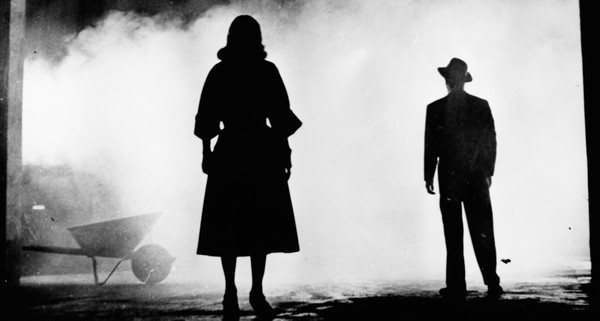Available on Dual-Format Blu-ray/ DVD from Mon 20 Nov 2017
The new Blade Runner is a timely reminder of the power of noir. The gritty city, rain-slicked streets, fizzing neon signs, femme fatales and the good-guy/bad-guy face-off all come from film noir. And few noirs have quite the same cachet as The Big Combo (Lewis, 1955), a key cornerstone in this four-disc boxed set. With no major stars and genuine night-time locations there’s some great realism here – the pep talks in the sweaty boxer’s locker room, grimy basements, the fogbound private airport, the hootchie-coochie club’s dusty backstage…
The big combo crime syndicate’s head honcho Mr Brown (Richard Conte) has a small-man complex: “First is first, second is nobody,” he says. But Detective Diamond (Cornel Wilde) knows a clammy loser when he sees one. “I’m going to open you up and operate,” he tells Brown. Diamond’s heart bleeds for Mr Big’s sad blonde gal (Jean Wallace), such a contrast to his own dark-haired dame (Helene Stanton), a floozy stripteaser. The detective treats her bad: “like a pair of gloves: when I was cold I called her up.” Can Diamond break Brown’s crime syndicate and stay sane? Does the mysterious Alicia hold the key? And what’s with Brown’s two creepy henchmen always pawing each other? The hard-boiled backtalk is nothing new but the joy of The Big Combo is its fine direction and exquisitely artful lighting and looming shadows. Tight editing and stylish camerawork all complement the modern Greek tragedy of the story.
John Garfield is one of two corrupted brothers involved in an illegal numbers racket in Force of Evil (Polonsky, 1948). It’s a complex story with German expressionist touches and a script that leans towards blank verse. Despite these drawbacks it works extremely well. The movie was a huge influence on Martin Scorsese’s Raging Bull and there are even echoes of The Wolf of Wall Street.
Rorschach inkblots, word association and Freud have all been discredited in favour of person-centred talking therapy but in the 1940s there were countless films that showed psychiatry as the ideal component in the pursuit of happiness. The Dark Mirror (Siodmak, 1946) has Olivia de Havilland playing identical twin sisters, one a schizo-psycho killer, one not. It’s not for screening during mental health week, that’s for sure, but it’s a suspenseful 85 minutes beautifully directed as the camera glides over dark shadows (of the mind).
The gothic Secret Beyond the Door (Lang, 1947) is a mesmerising, masterly film, again using the Freudian hook. A husband (Michael Redgrave in one of his rare Hollywood outings) is obsessed with rooms where murders have occurred. But what filthy thing lies beyond the door that’s always kept locked?
Some great extras and sparkling transfers totally justify the hefty price tag on this fine boxed set.
